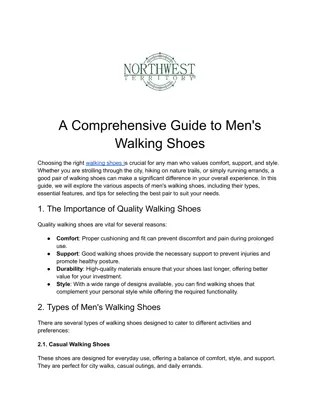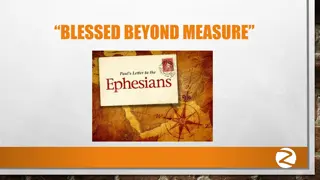Walking Worthy in Ephesians: A Chapter Overview
In the book of Ephesians, the apostle Paul emphasizes the importance of believers walking in unity, maturity, and purity. He encourages them to live in a manner worthy of their calling and to grow in Christ through truth, love, and righteous living. This chapter overview delves into Paul's exhortations to the Ephesians regarding spiritual growth and conduct as followers of Jesus Christ.
Download Presentation

Please find below an Image/Link to download the presentation.
The content on the website is provided AS IS for your information and personal use only. It may not be sold, licensed, or shared on other websites without obtaining consent from the author.If you encounter any issues during the download, it is possible that the publisher has removed the file from their server.
You are allowed to download the files provided on this website for personal or commercial use, subject to the condition that they are used lawfully. All files are the property of their respective owners.
The content on the website is provided AS IS for your information and personal use only. It may not be sold, licensed, or shared on other websites without obtaining consent from the author.
E N D
Presentation Transcript
A Worthy Walk A Worthy Walk 4:1 4:1 6 6 Week 21 Week 21 22 June 2022 22 June 2022
EPHESIANS CH4 OVERVIEW Beginning with this chapter and proceeding through the rest of the epistle, Paul exhorts the Ephesians to walk in a manner worthy of their calling. Having described earlier how Jesus attained unity between Jew and Gentile through His death on the cross, Paul now pleads with them to walk in unity. With humility, gentleness, longsuffering, forbearance and love, they should be diligent to maintain the unity of the Spirit in the bond of peace. The unity of the Spirit is then defined as consisting of one body, one Spirit, one hope, one Lord, one faith, one baptism and one God (1 6).
EPHESIANS CH4 OVERVIEW Perhaps as motivation, Paul reminds the Ephesians of the gracious gifts Christ gave His church following His ascension to heaven. Such gifts included the offices of apostles, prophets, evangelists, pastors and teachers, which are designed to equip the saints for ministry and bring the body of Christ to maturity. In this way, the Ephesians should not be misled by false doctrine, but instead by speakingthetruth in love they should grow in Christ as each member does it share (7 16).
EPHESIANS CH4 OVERVIEW The last half of this chapter addresses the need to walk in purity. Contrasting how they once walked as Gentiles in licentiousness and greediness, they are reminded of the truth which is in Jesus. This truth calls upon them to put off the old man with its deceitful lusts, to be renewed in the spirit of their mind, and to put on the new man that is created in righteousness and holiness. Therefore they are called upon to put away lying, anger, theft, and all forms of evil speaking, lest they grieve the Holy Spirit by whom they were sealed for the day of redemption. Instead, they are to speak with truth and grace, work hard to help those in need, and be kind, tender-hearted, and forgiving just as God has forgiven them in Christ (17 32).
EPHESIANS 4 Paul begins the section with the word therefore. It is a word that prompts us to look back before pressing on. In other words, Paul pauses to say, In light of all the great theological truths I ve just shared, act in the following way. This chapter represents the literary hinge of Paul s letter. Think of the profound doctrinal principles he has been developing so far in the letter: Our adoption as God s children (1:4-5). The hope of our inheritance (1:11, 18). The truth of Christ s glorious rule (1:20-23). The riches of God s lavish grace (2:1-10). Our unity with God and each other (2:11 3:13). The glory of the Lord s incomprehensible love (3:14-21).
EPHESIANS 4 We hear a lot about people who believe one thing and do another, who talk the talk but don t walk the walk. Sadly, many Christians never seem to put the two together, to move from the talk to the walk, from faith to life, from calling to commitment. As we study the first sixverses of Ephesians 4, let s do so with a dedication to rise above mere head knowledge and put feet to our faith so that we walk in a manner worth of our calling in Christ.
EPHESIANS 4:1 3 1[Therefore], as a prisoner for the Lord, then, I urge you to live a life worthy of the calling you have received. 2Be completely humble and gentle; be patient, bearing with one another in love. 3Make every effort to keep the unity of the Spirit through the bond of peace.
EPHESIANS 4:1 3 For threechapters Paul has been emphasizing the calling. We have been called by God the Father, who decreed His plan of salvation in eternity past. We have been called by Jesus Christ, who implemented the plan through His incarnation, life, death, resurrection, and ascension. We have been called by the Holy Spirit, who regenerated us, sealed us, and empowers us to do His will. Having set the stage in chapters 1 3, it s as if Paul raised a megaphone to his mouth, pointed a finger our way, and shouted, And . . . Action!
EPHESIANS 4:1 3 The time has come to apply the truth of our calling to our lives. This is why Paul begins with the verb meaning I implore. It s the same word translated urge or exhort. There is passionate urgency in Paul s tone. He earnestly exhorts his readers not merely as an apostle with prophetic authority but as the prisoner of the Lord. As one who has been incarcerated for the sake of the gospel, his life has become an example to follow of living a life worthy of the calling. What does Paul urge them to do? To walk. This word refers to a person s conduct or lifestyle. The word walk sounds so manageable. Just put one foot in from of the other. Small ones if you have to, big ones if you can.
EPHESIANS 4:1 3 Just walk! Walk in the right direction, walk in the right way, and walk with the power of the Spirit . . . butwalk. Now, how should we walk? In a way consistent with our calling, which Paul described in chapters 1 3. The word worthy means being fitting or proper in corresponding to what should be expected. Paul calls his readers to live lives equal to the reality of their calling. What does this actually look like? For the next few verses, Paul paints a very clear picture of the kind of lifestyle that is worthy of the calling.
EPHESIANS 4:1 3 He beings in 4:2 by laying down five stepping-stones for a worthy walk, which we can summarize with five words. Where do these stepping-stones lead? Ephesians 4:3 shows the destination: the unity of the Spirit in the bond of peace. That s the goal of these deliberate steps in the Christian walk. To avoid any missteps, let s examine each step more carefully. Stepping-stones from humility to love . . . Humility Gentleness Patience Tolerance Love
EPHESIANS 4:1 3 HUMILITY: lowliness of mind. For the Christian it means putting Christ first, others second, and self last. Not a popular formula, is it? It was no more popular in the first century than it is today. The word paints the picture of a crouching slave abject, servile, in complete subjection to his master. Yet this is exactly the kind of attitude that accompanied Christ s incarnation and earthly ministry (Phil 2:5-8). In fact, he described Himself as gentle and humble in heart (Matt 11:29) and said that He came not to be served but to serve (Mark 10:45).
EPHESIANS 4:1 3 GENTLENESS: As we see in Christ s own self-description, humility and gentleness go hand in hand. Whereas humility is an attitude of mind, gentleness refers to the outward manifestation of a person s humble demeanor. Gentle people are not harsh with others, don t fight to get their way, and don t turn everything into a winner- takes-all competition. Instead, they demonstrate consideration for the needs and feeling of others. Like humility, gentleness is a vital step toward unity because it softens our sharp edges and keeps us from scraping, cutting, and bruising those who get close to us. If all of us in the church balanced our strength with humility and gentleness, as Jesus did, then virtually all our conflicts would disappear.
EPHESIANS 4:1 3 PATIENCE: Of the three virtues we have considered so far, the step of patience is the most difficult because it comes to us in the hardest way. It means exercising humility and gentleness in the company of disappointing, frustrating, and downright offensive people. It means sticking to something when everything within you and outside of you is pushing you to give in. Patience takes time to nurture, especially in our impatient world. We pace the room if the microwave takes thirty seconds. We zip through traffic if one lane is moving too slowly. We stare at our watches if the worship service runs ten or fifteen minutes over.
EPHESIANS 4:1 3 PATIENCE: Yet patience is essential if the church is to arrive at true unity. It allows all of us to learn at different paces, to make mistakes, and to hunker down for the lengthy, arduous process of steady spiritual growth.
EPHESIANS 4:1 3 TOLERANCE: Just as humility and gentleness form a firm footing in our worthy walk, patience and tolerance also work together. Patience predisposes us to endure all kinds of circumstances; tolerance helps us endure all kinds of people. Tolerant people reach our with forgiveness, understanding, and sympathy. They treat others with grace letting them grow with Christ in different ways and at different paces. Tolerant people welcome others with a warm embrace because their hearts have been embraced by Christ (1John 4:19). Paul obviously isn t talking about tolerating sin, wickedness, immorality, and evil. That s far from his mind, and it should be far from ours as well (1Cor 5:9-13).
EPHESIANS 4:1 3 TOLERANCE: Rather, Paul refers to showing mercy and grace to others, letting others live their Christian lives in ways that may not be exactly how we think they should. This means allowing people to develop their unique abilities without fear of being judged.
EPHESIANS 4:1 3 LOVE: The final stepping-stone on the path to unity is love once again agapeorunconditional love that expects nothing in return. In many ways, the previous four virtues describe what real love looks like, which is why Paul says we must have humility, gentleness, patience, and tolerance in love. Love looks out not for one s own interests but for the interests of others (Phil 2:4). All of these stepping-stones together point the way to true unity.
EPHESIANS 4:1 3 Like a quiet clearing at the end of a garden path, the unity of the Spirit in the bond of peace marks a point of progress in the walk worthy of our calling (4:3). Yet having arrived, we must work diligently to preserve it. We need to safeguard it from those vices that stand in direct contrast to the five virtues just mentioned: a prideful ego, a severe demeanor, an irritable spirit, a judgmental heart, and a hateful attitude. Unity needs to be a persistent and consistent goal of every member of the body of Christ. Because Christ has called us in peace (2:14-15), we must nurture the bond of peace in our daily walk (4:3).
EPHESIANS 4:1 3 In a divisive, warring, hurtful world, the most powerful testimony the church can give is genuine unity prompted by true love and shown in the example of peace. Sadly, however, there s not a more divided church on any continent or in any era of church history than there is in the United States today. It s nothing short of tragic. Every city has its own stories of church splits some of them are legendary. Towns and villages have pastors that won t talk to each other, much less support or encourage one another. As believers committed to walking in a manner worthy of our calling, we should all cry out, What a shame! Because when unbelievers observe our disregard for unity, they think, What a sham!
EPHESIANS 4:4 6 4There is one body and one Spirit, just as you were called to one hope when you were called; 5one Lord, one faith, one baptism; 6one God and Father of all, who is over all and through all and in all.
EPHESIANS 4:4 6 So fundamental is unity to the Christian walk that Paul shines a light on seven of its facets. These are seven things that all believers share, regardless of denomination, location, age, worship preference, or any other things that might divide orthodox, Bible-believing, evangelical churches. In this list, note that these are present realities they don t just exist in some ideal future when God finally breaks down the barriers to church unity. Rather, these are seven pillars upon which practical unity can be built. Let s briefly survey them . . .
EPHESIANS 4:4 6 ONE BODY: Jew and Gentile, slave and free, male and female, rich and poor, young and old all of these otherwise conflicting types of people have been placed in one body, the church. There was never meant to be the old people s church and the young people s church. God didn t establish a rich people s church and a poor people s church. He didn t have in mind a black church and a white church . . . or a traditional church and a contemporary church. There is one body!
EPHESIANS 4:4 6 ONE SPIRIT: The same Spirit of God gives life to and dwells in every believer. He calls us through various means. He gifts us in various ways. Yet He indwells all of us equally. There are not different Holy Spirits for different people and different groups (1Cor 12:4-11). One Holy Spirit gives all of us new life.
EPHESIANS 4:4 6 ONE HOPE OF OUR CALLING: All Christians share the hope of eternal life (Titus 1:2), which is centered in Jesus Christ, who is our hope (1Tim 1:1). That s a common vision of the future all Christians are expected to share. One of the great divides among Bible-believing Christians, however, relates to end-times events. Will there be a Millennium? A Rapture before the Tribulation? How will it all pan out? Yet even in the midst of these great difference, all of us share a common hope eternal, sinless, painless, deathless joy in the presence of God (Rev 21:4-7, 22-27). We should emphasize these grand truths that unite us rather than the minor issues that divide us.
EPHESIANS 4:4 6 ONE LORD: Paul already mentioned that all believers share in one Spirit, commonly called the third person of the Trinity. Paul then refers to the second person of the Trinity: the one Lord, Jesus Christ. All true Christians have been saved by grace through faith in the person and work of the one Lord.
EPHESIANS 4:4 6 ONE FAITH: All Christians are united by one faith. In this instance, the word faith probably means the body of essential Christian truths, as used in Jude 1:3 the faith which was once for all handed down to the saints. That is, the basic Christian doctrines concerning the Father, Son, and Holy Spirit; the person and work of Jesus Christ, the God-man who died for our sins and rose from the dead; and other core teachings that unite Christians in the same faith. Simply put, there are no legitimate Christianities but only one true Christianity. Even though different churches, denominations, and believers may have unique perspectives and interpretations regarding nonessential matters, all orthodox evangelicals agree on the essential truths revealed in Scripture.
EPHESIANS 4:4 6 ONE BAPTISM: Regardless of the various methods of baptizing, the age of a person when he or she is baptized, or what words are used in the observance, all Christians believe that baptism is the rite of initiation into the Christian faith. Through baptism we publicly proclaim our identification with Christ an outward expression [sign] of an inward change [reality]. The methods may vary, but every true Christian church practices this essential ordinance.
EPHESIANS 4:4 6 ONE GOD AND FATHER OF ALL: As the last of his seven facets of unity, Paul mentions the first person of the Godhead: God the Father. As those saved through faith in His Son and the regenerating work of the Spirit, all Christians look to one Father. If anyone would still doubt that all believers are truly united with one another, Paul makes it crystal clear that the one God is over all and through all and in all (4:6). As the Spirit, the Son, and the Father are one, so we are also one, we who were created in God s image and re-created to be conformed to the image of Christ (Rom 8:29; 2Cor 3:18). What a wonderful reasons to walk in a manner worthy of the calling with which we have been called!
Lesson Applications for a Worthy Walk
EPHESIANS Application of Chapter 4:1 6 We are aware that each of us is unique. We have different temperaments, gifts, experiences, convictions, interests, blessings, and different pains and scars. Yes, one of the things we all have in common is that each of us is completely different. But surely people with so many different backgrounds can t live together in peace, can they? Can Paul s seven theoretical facets of oneness be translated into lasting unity?
EPHESIANS Application of Chapter 4:1 6 In order to maintain purity of doctrine and practice, we need to break away from believers who aren t living up to our standards, don t we? Surely God cheers us on when churches split over incidentals or when Christians shun one another over a difference of opinion, right? Wrong! We need to repent of these ways of thinking and to stop these ways of acting. None of these things reflect a walk worthy of our calling. None of them flow from a life of humility, gentleness, patience, tolerance, and love.
EPHESIANS Application of Chapter 4:1 6 Let s look at where they could come from . . . Ask yourself, am I a gossip? Do I spread rumors? Do I sow discord within the family of God? Do I ignore the major truths that unite me with other believers? Do I quickly lose patience with others? Do I hold grudges? Harbor bitterness? If you find yourself guilty of any of these charges, ask yourself, Why do I do these things?
EPHESIANS Application of Chapter 4:1 6 Where did you learn this? You didn t learn it from Christ. You weren t moved toward disunity and discord by the work of the Spirit. You didn t become a part of the church s problem by pursuing obedience to God the Father. Where did this come from? It came from one or more of three sources: the world, the flesh, and the devil. When you find yourself guilty of these things, throw yourself upon God s mercy and claim His forgiveness. Then, commit to the unity of the Spirit in the bond of peace (4:3).
NEXT CLASS 29 June 2022 Before next class, read the below verses in the Before next class, read the below verses in the NIV and in one other versions of the Bible, i.e., NIV and in one other versions of the Bible, i.e., NKJV, NRSV, KJV, CEV, etc NKJV, NRSV, KJV, CEV, etc Chapter 4:7 16 Embracing a Full-Bodied Ministry























